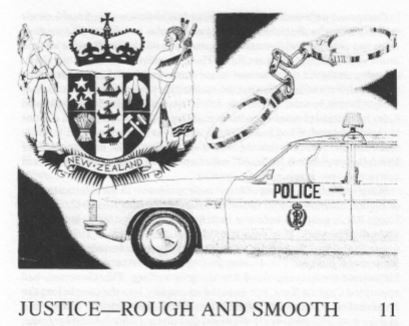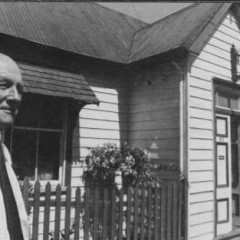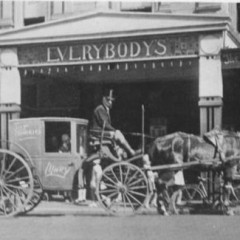11
'We live in a sick society ... a society which, among other things, has a' preoccupation with sex, pornography, television violence, drugs, and general disorder. I see a decline in the national moral fibre and an apparent readiness to accept a drop in community standards ... a disturbing permissiveness has crept in disguised as progressive thinking .. ' I When K. B. Burnside, a former Commissioner of Police, expounded these views to a Rotary meeting in New Plymouth in 1979, he was referring to the national trend: during the 1969-79 decade a 70% increase in the volume of offending had occurred, and although the larger centres assumed the lion's share, there was concern in the city over the growing crime rate. Burnside added that one of the causes of this disturbing trend was that staff increases had not kept pace for economic reasons. His argument was not new. When in 1841 Governor Hobson appointed Captain Henry King, RN, Captain Cooke, George Cutfield, William Halse, J . T. Wicksteed and Josiah Flight to the' Commission of the Peace' at Ngamotu (Captain King as Senior Justice and Police Magistrate) one of the legal officers writing to his father in London remarked: 'You will be pleased to hear that I am one of the five magistrates. The Governor, however, made a sad mistake in not insulting me with two or three hundred a year. He thought that I came out as a gentleman. A sad delusion: I am only working hard to become one. Compared with the comparatively lawless situation which had existed in many other settlements, New Plymouth was fortunate. The settlers were too occupied with establishing homes and clearing land to devote much time to really serious crime. There were instances of stock theft, assaults, domestic disputes and other minor anti-social activities which were dealt with summarily, but the main offence was drunkeness. One of King's first acts was to swear in John Newland as chief constable and jailer, and other constables whose main duty was carrying mails on foot to Auckland and Wanganui. King's 'crime list' between April 1, 1841, and June 30, 1843, reveals the moral soundness of the settlement.
The European population 1117-627 males and 490 females. Two males were convicted-for arson and pig-stealing. King's law enforcement officers were assiduous in the administration of justice. John Newland records in his diary: 'May 12, 1842. Captain King, RN, examined before a bench of magistrates for selling spirits without a licence. Five days later the Resident Agent, J. T. Wicksteed wrote to Colonel Wakefield: 'We got safely here on Tuesday last after a very rough passage ... I came just in time to save our Chief Police Magistrate from being fined for sly grog selling. The Governor had appointed Captain King, but directed an enquiry into the case before the Magistrates. King and Cutfield were much annoyed, for Cooke and Halse, it was known, were disposed to convict; and the complainant, Veritas Brown, had got up his case pretty well, but a little private conversation between the two magistrates effected a beneficial change; the charge was dismissed and Captain King was exeedingly grateful for my rather irregular interference.' King resumed his duties, which included granting licences to sell liquors. Seffern records that he issued a licence to 'a person to sell spirits, although a complaint had been lodged against him for keeping a disorderly house such as allowing card playing on Christmas Day; and on the following Sunday there was fighting in the house. At the same time a person lodged a complaint against another for tearing his shirt off his back ... It was evidently a very difficult task for those in charge to keep order and sobriety seeing what a mixed class of men formed the crew at the whaling station (at Ngamotu); but amongst the early records there appear to have been no charges of dishonesty or other crimes laid against the men, who though perhaps lawlessly inclined, kept honest for fear lynch law would be brought into force.'
When crimes were committed justice was harsh: On November 25, 1843, 'Thomas Noland, John Clarance, George Ovingdon and Edward Hicks alias Wilson' were taken by Newland to Auckland aboard ship, where they stood trial for 'Robbery in the dwelling house ofMr Gledhill, storekeeper.' Tried on March 1, 1844, the prisoners were found guilty 'and sentenced to be transported for ten years each'. In June, 1846, an armed police force consisting of 13 Europeans and three Maoris was established in New Plymouth under command of Sergeant Henry Halse, which was systematically trained and drilled by Donald (later Sir Donald) McLean, Protector of Aborigines. Records of police affairs in New Plymouth are sketchy. Both newspapers contained accounts of court cases, but in very few instances were activities of individual policemen recorded. When officers died, retired or were transferred, the Press invariably praised their 'selfless service to the community', or 'his impartiality earned the respect of all citizens' , but few official records are available. The National Archives in Wellington hold some police files for the period 1886 to 1900, but most files from that date onwards were destroyed by the police in the late 1950s.
Some old New Plymouth police district records, including leather- bound station diaries and 'occurrence books' which detailed events in most local police stations, were for some years housed at police headquarters in the city. But these were sent to Wellington in the late 1960s and apparently are no longer in existence. However, extracts from variousjournals, local histories and personal diaries reveal a few police activities which mirror conditions in earlier years. Newland's diary cites the case of Thomas Pilcher, a man burdened with problems. In 1814 while serving in the Royal Navy he lost a leg in action, in compensation for which he received an annual pension of$32. On arrival in New Plymouth he built a raupo whare where he lived with his wife. It was not a happy marriage, as the diary indicates: 'Tuesday, May 24, 1842: Mrs Pilcher threw herself into sea; took her out; husband stood by unconcerned. Monday 30th: Pilcher committed to prison for want of bail; wife swore the Peace against him.' On December 26 he was arrested for threatening to burn his house down. Captain King heard the case and decided it was arson and as such beyond his jurisdiction. Pilcher was committed for trial to the Supreme Court in Wellington. It was three months before a ship was available to take him and the five witnesses to Wellington, where the charge of arson was dismissed and he was convicted for threatening to set fire to his house. Five weeks later the party arrived back in New Plymouth.
Another Supreme Court case, this time held in New Plymouth, was that against Richard Brown, 'merchant and whaling master', whose enterprise and business ability were woven into the first 20 years of the town's history. His remarkable influence and control over the Maoris notwithstanding, he eventually fell foul of them. He possessed an imperious temper, and often administered his own brand of justice. This misfired when on July 27, 1848, he hit Witana Rengi-ire, a Maori of rank, on the head with the brass knob of his riding whip, rendering him unconscious. 'This roused the Puketapu hapu to a dangerous mood. They assembled in force, danced their war dance in what is now Devon Street and again in Lower Brougham Street, and practically took possession of the little town with the avowed intention of securing utu (revenge) and burning it had the incident ended fatally. Fortunately for the innocent populace the native's skull proved stout and of good quality, and he rallied after 48 hours of dangerous suspense. For the safety of the town and himself, Mr Brown was at once arrested and placed in the stone gaol in James Lane, around which the Natives kept a close watch.


